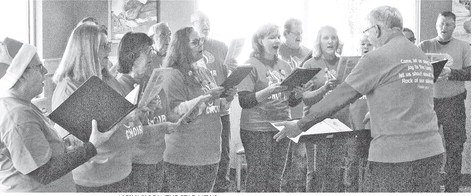County approves hiring new case manager
The second time was the charm for a request to fill a case manager position for adult protective and crisis services in the Taylor County Human Services Department. After a lengthy discussion, members of the personnel committee on Tuesday approved the position.
With the number of adult crisis cases spiking over the past year, the human services department had requested the position last month as a way to reduce the burden and potentially save the county money in crisis placement. According to human services director Liza Daleiden, by being able to take more time and address issues earlier the county can work to keep those in need from higher-cost inpatient programs to other community- based options. In addition it is hoped the position would reduce the amount of overtime for the department as the current staff struggles under the mounting caseload.
“They are burning out,” Daleiden said. She said she has great workers and is worried about losing them as they burn out.
One of the issues that caused headaches among committee members last month was the cost of the position. While funding for it would come from a variety of program sources including grants, billable hours, and projected savings. The end result would be about an additional $5,000 in personnel costs for the county than in the past.
Committee member Scott Mildbrand said he would be voting against the request because, in part he believes it will cost much more for the county than projected. He said he feels that about $36,000 of the costs to cover the position are based on “wishful thinking” and said it would be impossible to attempt to quantify potential savings.
Jen Meyer of the human services department disagreed saying that it often takes a large number of phone calls to find the appropriate placement for individuals in crisis and that having the time to do so saves the county money.
“I don’t know that the county can afford to not pay for mental health services,” said Rollie Thums, who chairs the human services board.
County public health director Patty Krug noted that there were additional grants coming in the pipeline that could be used for mental health staffing needs as part of the COVID relief aid. The rules for those grants are currently being finalized.
Human services personnel were quick to note that any grants would be simply to get the position up and running and would not be a long-term way to pay for it. They expressed belief that with the savings, increase in billings and cost savings elsewhere the position would eventually cover itself.
COVID surge
After months of low numbers, Taylor County is seeing a renewed surge in the number of COVID-19 cases. Krug told committee members that as of Tuesday afternoon her department was monitoring 86 positive cases in the county with contact tracing on 62 others, with six locals hospitalized. She noted that two had been discharged from the hospital.
With the spike in caseload, Krug was asking for an extension to the additional compensation salaried workers in her department receive for hours worked beyond 45 hours a week. Earlier this year, the county had authorized the pay with it to expire on August 31. The cost for the additional pay comes from federal CARES Act funds and Krug said they are only using it as they need it. She noted that earlier this summer they had been able to have a a month where no one in the department needed to be working weekends in order to do contact tracing. She said that was the first time since May 2020. “We were happy with that,” she said.
Mildbrand said there was no doubt that the employees should be compensated for the hours they are working. However, he said it is hard for him to wrap his mind around allowing places like Lambeau Field and American Family Field to be at capacity during the pandemic and at the same time requiring local counties to do contact tracing.
“The people who are vaccinated, they don’t care about contact tracing, and the people who aren’t vaccinated don’t care about contract tracing,” he said, leading him to question if it was necessary.
Krug said that as a communicable disease she is required to do the contact tracing by state health officials. “We have to continue to try to protect the public,” she said.
While it is unknown as to which variants are most prevalent in local cases, Krug said that she is seeing differences in this surge compared to previous ones. She noted that people in this surge are sicker and appear to be showing symptoms within three to five days as opposed to seven to 10 days. She said the case spread in the county is from those less than one year old to those 90 years old. While it is being tracked, Krug said she did not have the local statistics for how many people who are vaccinated have gotten ill versus nonvaccinated. She noted that with her department down two nurses, tracking that data has not been a high priority.
“We are a little overwhelmed right now,” she said. Krug did note that those who were vaccinated in general showed much milder symptoms reporting that they feel like they have a head cold.
At the same time the county has seen a surge in the number of COVID-19 cases, they have also seen an increase in the number of people getting vaccinated. Krug said that in the past week her office administered 79 vaccinations and she projected the county may reach 30% vaccination rate by the end of this week.
With the increase in the cases, personnel committee members approved raising the pay for the limited term employees hired as contact tracers from $26 per hour to $30 per hours effective August 1 and through the end of the year.
Under the CARES act, the health department had received $350,000 in funding for contact tracing but it requires county authorization to set the pay for the temporary workers.
“I am hoping I am not in a position where I am using $350,000 for contact tracing,” Krug said. In other business, members of the personnel committee approved a revision in the premium pay for highway department employees when they take on additional duties. According to highway commissioner Ben Stanfley it has been about eight years since the premium pay was adjusted and with the county facing retirements in the department he wanted to ensure they were competitive with other highway departments in the region. As part of the changes, the county will also adjust the premium pay annually to adjust it for cost of living increases.



